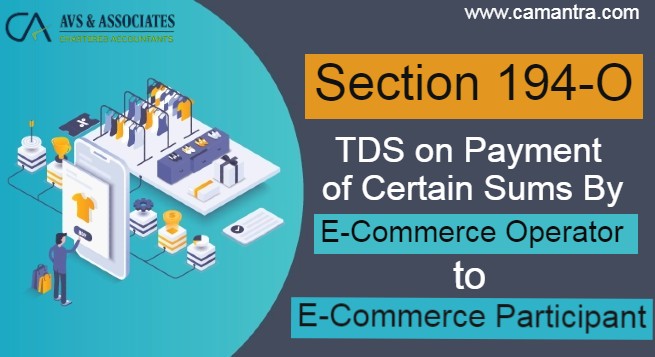According to the Income Tax Act, 1961- Section 194-O describes TDS on Payment of certain sums by e-commerce operator to e-commerce participant.
Section 194-O of Income Tax Act, 1961 is introduced with effected from 01 October 2020. As per the Section 194-O where sale of goods or services of an e-commerce participant is facilitated by e-commerce’s operator by their digital platform, such e-commerce operator shall, at the time of amount credit of sale /services or both to the e-commerce participant’s account or at the time of payment thereof to such e-commerce participant via any mode, deduct 1% income tax of the gross amount of such sales or services or both.
An “e-commerce operator” is defined comprehensively to mean a person who owns, manage and operates’ digitally or through electronically commerce and is responsible for paying to e-commerce participant. The use of such digital platform where such facility or platform is owned, managed and operated by others is not enough for a person to be falling within the meaning of the term. The e-commerce Operator could be a non-resident or resident.
Previously, there was no any tax deduction on payments made to e-Commerce participants. They were needed to file their income tax returns independently. That’s why many small e-Commerce participants did not file their income tax returns (ITR) and evaded the tax liability.
What is the Scope of Section 194O?
- E-Commerce operators need to deduct TDS at the rate of 1% at the time of credit of the amount of sale of goods or amount of sale of services, or both to the e-commerce participant’s account or at the time of payment making to an e-Commerce participant via any other mode, whichever is earlier.
- E-commerce participant being a resident individual or Hindu Undivided Family (HUF): E-commerce operator is not required to deduct TDS if the gross amount of sale of goods, services, or both during the previous year does not exceed INR 5 lacs and if the e-Commerce participant has furnished his/her PAN or Aadhaar card.
- If the e-Commerce participant does not give his/her PAN or Aadhaar card, TDS will deducted at the rate of 5% as per the provisions of Section 206AA.
- E-Commerce participant being a non-resident: As said earlier, an e-Commerce participant must be a resident of India. That’s why; no TDS will be deducted if the participant is a non-resident.
For Example :- A proprietary firm ABC (e-commerce participant) is selling its products via Amazon/Flipkart (e-commerce operator). Mr. X buys this product online from ABC for INR 50,000 on 1 October 2020. Amazon/Flipkart credits the account of ABC on 1.10.2020, but the customer makes the payment directly to ABC on 15 October 2020. In this case, Amazon/Flipkart is needed to deduct Tax Deducted at Source (TDS) at the rate of 1% INR 50,000 at the time of credit to the party or making payment, whichever is earlier. In this case on 1 October 2020 TDS should be deducted.
What is the Purpose of Section 194O?
The main motive of the introduction of Section 194-O is to broaden the TDS base by bringing e-Commerce participants under the tax base. Nowadays customers prefer digital platforms for buying or selling of goods and services because of their different perspective:
From the buyers’ View: There are many options are available at one platform and the comparison between products becomes very easy.
From the sellers’ View: It requires less cost for creating the setup and less effort for the search of buyers.
This has resulted in enhance the number of e-Commerce users over a period of time. It is very tough to identify small sellers (e-Commerce participants) who escape their income tax returns and do not file it. So, the government of India has enlarged the tax base to bring such e-Commerce participants under the tax base.
Who are exempted from Section 194O, if any?
1. E-Commerce participant who are non-resident are exempted from the scope of this section.
2. A ceiling limit of INR 5 lacs is set only for resident individuals and HUF. So, an e-Commerce operator is not needed to deduct TDS if the amount, paid or credited to individuals/ Hindu Undivided Family during a financial year, does not exceed INR 5 lacs.
The introduction of Section 194-O of Income Tax Act, 1961 will result in rising in the revenue for the government by reducing tax evasion.

